|
|
|
Sort Order |
|
|
|
Items / Page
|
|
|
|
|
|
|
| Srl | Item |
| 1 |
ID:
169864
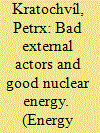

|
|
|
|
|
| Summary/Abstract |
For Central and Eastern European countries, energy security has been one of the top political topics ever since the 2009 gas crisis. Although these countries have a shared interest in this issue, their preferences – especially those regarding the role of Russia as their main energy supplier – are not identical. This paper examines and juxtaposes the discourses on natural gas supply in the Czech Republic and Slovakia. Utilizing a broadly constructivist perspective, the article explores the media discourses connected to energy supplies in these countries. Methodologically, the paper employs critical discourse analysis to examine this discourse. The paper argues that the media discourses in both countries underline the overall unreliability of the external environment and stress the necessity to rely on domestic energy sources. In the Czech case, such an environment also includes the EU, which translates into a critical stance towards renewable energy, viewed as being forced on country by the EU. In contrast, the Slovak discourse presents the EU as a suitable arena for energy cooperation. Both countries agree on the support for nuclear energy, which is considered to be a domestic – and therefore most reliable – energy source.
|
|
|
|
|
|
|
|
|
|
|
|
|
|
|
|
| 2 |
ID:
170124
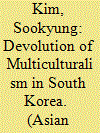

|
|
|
|
|
| Summary/Abstract |
This paper examines South Korean media coverage of migrant workers from 1990 to 2015 and analyzes how multiculturalism is intertwined in discussions of migrant workers. I find that South Korea, once an avid supporter of multiculturalism, is slowly retreating from it, like other countries, but not in the same direction.
|
|
|
|
|
|
|
|
|
|
|
|
|
|
|
|
| 3 |
ID:
184047
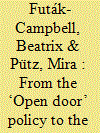

|
|
|
|
|
| Summary/Abstract |
This article explores Angela Merkel’s decision to open Germany’s borders to refugees in September 2015 and her support for the EU-Turkey statement in March 2016. While the first policy offered relief to refugees, the second was designed to significantly reduce the number of refugees coming to Europe. Besides the seemingly contradictory rationale behind these two foreign policy decisions, the role that domestic media played in Merkel’s decision to open the borders was remarkable. The connection between media reports and public opinion has long been established, whereas the connection between foreign policy and the media is more recent. However, the link between all three and how they operate together is yet to be studied. By exploring these connections, we show how foreign policy decisions can be accepted by locals within a language context that fosters identification with outsiders. Similarly, a shift in the discourse, which contributed to the perception of a divergence of interests between the local population and the refugees, helps to understand the subsequent change in foreign policy. In short, we show how this shift provides an insight into the parallels between domestic media discourses, public opinion and foreign policy decisions. We apply deductive qualitative content analysis to demonstrate this connection.
|
|
|
|
|
|
|
|
|
|
|
|
|
|
|
|
| 4 |
ID:
161472


|
|
|
|
|
| Summary/Abstract |
This article deals with the frequency of the use of English and Arabic loanwords in the central Kurdish dialect. Whereas a dramatic increase in the frequency of use of English loanwords was witnessed most notably in 2005 and 2011 in response to political and economic changes in Kurdish society, this was not the case with the frequency of Arabic loanwords reduced gradually following 1992 when Arabic ceased being used as an official language in the Kurdistan Region of Iraq (K.R.I.). In particular, I examine the period from 2003 to 2013 as an important era due to a series of radical changes in socio-political domains in Kurdish society that resulted in a considerable number of borrowings in the representation of political notions but also because of the Kurdish and English languages intense contact. This article will further look at phonological changes of English loanwords over a period of time as a consequence of language contact. The diachronic analysis suggests that in some cases Kurdish writers have been motivated by their desire to use a form closer to English than Arabic. Methodologically, the study is based on a systematic research of political articles published in the Xebat newspaper. Finally, the article deals with the process of orthographic adaptation of the loanwords. The results indicates that the majority of these loanwords are adapted to the structure of this dialect of the Kurdish language.
|
|
|
|
|
|
|
|
|
|
|
|
|
|
|
|
| 5 |
ID:
143652


|
|
|
|
|
| Summary/Abstract |
The study explores through a ‘transnational lens’ the Romanian media construction of remitting practices and identities within a wider debate on circular migration. It uses a broad definition of remittances (financial, sociocultural and political) and is concerned with the role of the Romanian press in articulating migrant–non-migrant relationships and laying the ground for informed policy debates. The methodology consists of qualitative corpus analysis and discourse analysis applied to a corpus of 221 news articles. The main findings indicate an overall positive evaluation of remittances (with the main exception of family separation), which endows migrants with social recognition as development agents and is used to justify various policy initiatives, but at the same time disempowers them through instrumentalisation. Even though limited in scope, grassroots migrant–non-migrant interaction, combined with a critical journalistic stance in editorials, opens up an avenue towards negotiation and joint transnational actions.
|
|
|
|
|
|
|
|
|
|
|
|
|
|
|
|
| 6 |
ID:
175636
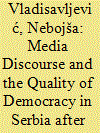

|
|
|
|
|
| Summary/Abstract |
The article examines the quality of democracy in Serbia via the quantitative analysis of media discourse. It reveals robust competition, participation and accountability in the first decade after regime change, followed by major recent decline, thus showing that expert assessments from influential indices of democracy underrated democratic quality in the former period and overrated it later. Also revealed are the advantages of complementing expert assessments with those based on media discourse. The content analysis examined 1,921 coded items from print and electronic media coverage of major political conflicts at strategic points in the country’s democratisation.
|
|
|
|
|
|
|
|
|
|
|
|
|
|
|
|
| 7 |
ID:
101446


|
|
|
|
|
| Publication |
2010.
|
| Summary/Abstract |
This article looks at the perception of Jewish-Israeli nationality and the boundaries of the Israeli collective, as reflected in the media coverage of foreign basketball and soccer players during the years 2002-2006. We show that while foreign athletes play a central role in the efforts of Israeli sport clubs, they remain largely excluded from the Israeli collective. At times they are partially included in the collective via discourses that emphasize their contribution to the "common good." However, this inclusion remains provisional and incomplete. Much like in other countries, it is contingent on excellence on the court. We also show the dominance of a unique ethno-Jewish discourse, demanding that foreign and naturalized players, especially if they are not Jewish, constantly pronounce their loyalty to the state and demonstrate familiarity with the Jewish people and their religion, language, and traditions.
|
|
|
|
|
|
|
|
|
|
|
|
|
|
|
|
| 8 |
ID:
152494
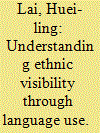

|
|
|
|
|
| Summary/Abstract |
This study investigates how the ethnic visibility of Taiwan Hakka is improved through language use. The usage of a unique Hakka symbolic code is focused on. Based on data from the four Taiwan major newspapers, an analysis with text techniques shows that the code emerges along with social-political developments in Taiwan, with its meaning turning from negative to positive connotation. Its frequency is highly correlated with major political events in Taiwan, with peaks during the two or three years before presidential elections. It illustrates semiotic innovation, extending from Hakka to Hakka non-human, to non-Hakka, and to non-Hakka non-human frames. The salient image it creates increases Hakka ethnic visibility and enhances their ethnic identity. A significant implication is that minority ethnic groups can employ a unique symbolic code, empowering it with positive connotation. Through extensive language use, its representation can raise their ethnic visibility and enhance their ethnic identity.
|
|
|
|
|
|
|
|
|
|
|
|
|
|
|
|
| 9 |
ID:
159838


|
|
|
|
|
| Summary/Abstract |
This article analyses how Chinese media make sense of smog and air pollution in China through the lens of London's past. Images of London, the fog city, have figured in the Chinese press since the 1870s, and this collective memory has made London a powerful yet malleable tool for discursive contestation on how to frame China's current air pollution problem, which constitutes part of news media's hegemonic and counter-hegemonic practices. Although the classic images of London as a fog city persist to the present day, the new narrative centres on the 1952 Great Smog, which was rediscovered and mobilized by Chinese news media to build an historical analogy. In invoking this foreign past, official media use London to naturalize the smog problem in China and justify the official stance, while commercialized media emphasize the bitter lessons to be learned and call for government action.
|
|
|
|
|
|
|
|
|
|
|
|
|
|
|
|
|
|
|
|
|